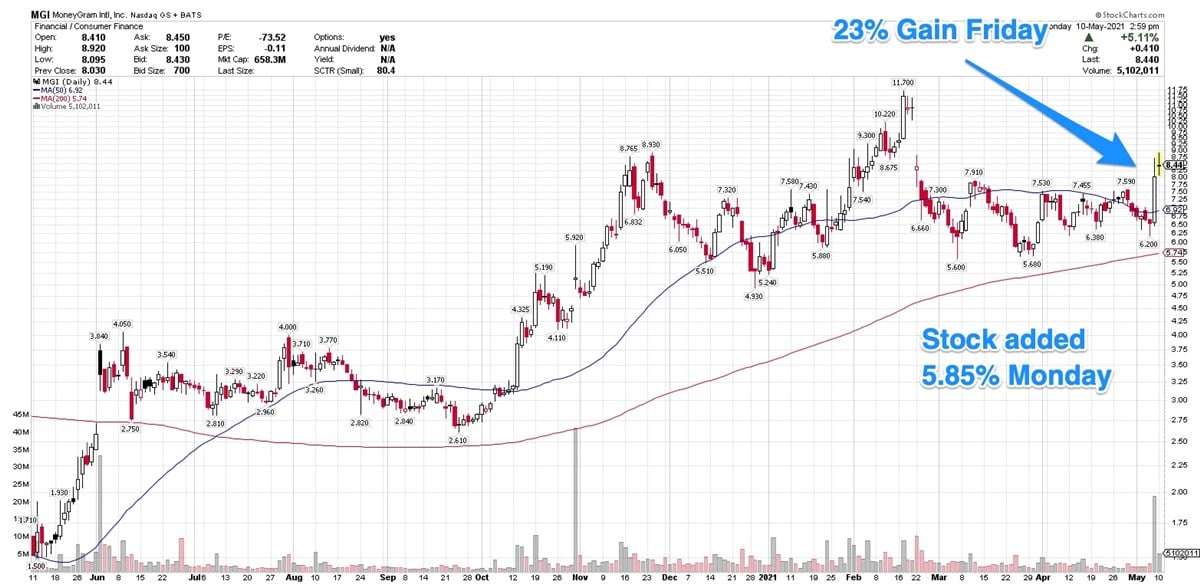MoneyGram International Leaps 23% In Monster Volume Shares of MoneyGram International (NASDAQ: MGI) popped 22.78% Friday, and tacked on another 6.85% Monday, following the money transfer specialist's first quarter report. Digital transactions are on the rise, and the company is wrapping up its agreement with the Justice Department.
By Kate Stalter
This story originally appeared on MarketBeat

Shares of MoneyGram International (NASDAQ: MGI) popped 22.78% Friday, and tacked on another 6.85% Monday, following the money transfer specialist's first-quarter report.
The company's main focus is cross-border transactions. For example, a worker in the U.S. with family in another country can send money home, using the Moneygram app.
The company reported a loss of $0.06 per share on revenue of $310.1 million. The loss was a penny wider than a year ago, but revenue grew 7%.
It wasn't those numbers, per se, that got investors excited, though.
In the company's earnings call, CEO Alex Holmes noted the strength of the company's digital capabilities. Historically, MoneyGram operated brick-and-mortar locations where people could send and receive money.
Being the 21st century, customers wanted to accomplish these tasks from their phones, and the company launched its app, MoneyGram Online.
"In the first quarter, revenue exceeded expectations driven by double-digit money transfer revenue growth of 12% and money transfer transaction growth of 14%," Holmes said in the call.
All-time High Transactions
Year-over-year money transfer transactions grew at a rate of 46% in April, with the company logging its largest number of transactions ever. MoneyGram Online also achieved an all-time high for transactions.
Holmes offered more detail on the digital revenue stream.
"It's hard to believe that in just over two short years since we launched our new app, we've built a digital business that has rapidly grown to reach $60 million this quarter," he said. "This growth trajectory rivals out of any other fintech across the entire financial services industry, and we could not be more excited. At the end of March, digital transactions accounted for 32% of all money transfer transactions, approximately double the percentage at the start of 2020. This is fundamentally a new company, a new MoneyGram."
As good as that sounded to investors, the company had even more important news.
Back in 2018, the company signed an agreement with the U.S. Department of Justice, surrounding its anti-fraud and anti-money laundering program, which regulators found to be deficient. As part of the deal, the company forfeited $125 million, and agreed to deferred prosecution. That means the company agreed to requirements set forth by the Justice Department.
Cut to May 2021, and the company announced that it was nearing the end of its deferred prosecution agreement.
"We have satisfied our financial obligations under the DPA and have received the final report of the independent compliance monitor, which has certified the company's compliance program," said Holmes.
Improved Compliance Standards
"I'm proud of the industry-leading compliance program that we've built. We have implemented the highest consumer data collection capabilities in the industry and our customer ID verification standards, technology platforms, and data-driven controls have helped to bring consumer fraud rates to all-time lows," he added.
Looking ahead, the company guided toward revenue between $315 million and $325 million, up slightly from the most recent quarter, but a minimum of 12.6% higher than the year-ago quarter.
There's a potential risk factor in its brick-and-mortar business, in the form of competitor Western Union (NYSE: WU) launching international money-transfer services in Walmart (NYSE: WMT) locations.
"Not to say that the walk-in business is going to collapse or go away; it's just I think the momentum is just continuing to shift toward digital properties and assets around the world," said Holmes. 
This company has a very small market cap of only $618 million. No surprise, it also has a high beta, 1.22. A look at the chart confirms the volatile trade, particularly since its earnings report in late October of last year.
Wide intraday price swings can indicate large differences between the bid and ask prices. Due to lack of liquidity in small stocks, those differences are often more pronounced than in a large cap.
MoneyGram has been forming a choppy consolidation below its February 17 high of $11.70. So far, it has not undercut its prior structure low of $4.93, meaning the base count would not be reset.
Shares are trading between $8 and $9, with upside trading volume on Friday and Monday coming in higher than average.
Featured Article: What is the significance of a dead cat bounce?











